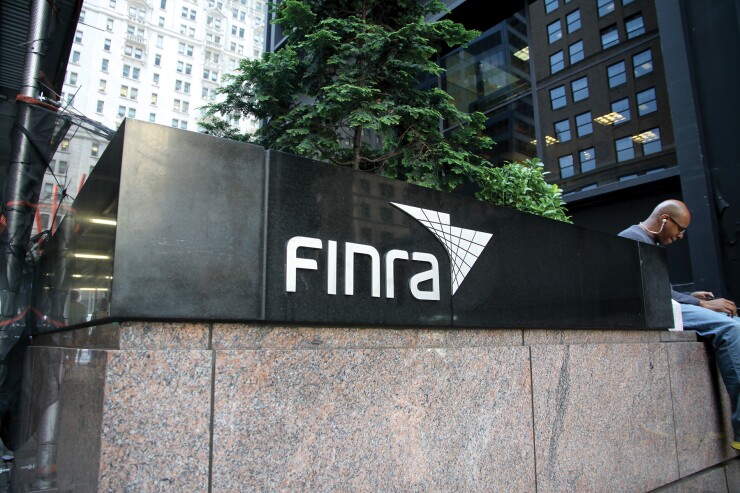
Industry groups representing the brokerage sector have been working to gin up opposition to FINRA's controversial proposal for a data-sharing system, warning that the so-called CARDS system would carry high compliance costs and put clients' information at risk, among other concerns.
Meanwhile, some consumer advocates are urging FINRA to move ahead with the rules, arguing that they are a needed protection for investors from industry abuses such as churning and pump-and-dump schemes.
Monday marked the deadline for interested parties to file comments with FINRA on the CARDS proposal, which will now come under an internal review as the industry regulator considers its next steps.
FINRA spokesman George Smaragdis declined to offer a timetable for when the organization might advance the initiative, saying only that officials will carefully review the comments in the docket before determining how to proceed.
"FINRA welcomes comments on this important proposal and takes these comments very seriously," Smaragdis wrote in an email. "We are keenly focused on the specific issues raised in the comment letters, and we intend to address any and all meaningful risks before moving forward."
Once FINRA receives comments on a regulatory notice, staffers will evaluate the feedback and determine whether to revise the proposal and resubmit it to FINRA's board, or to send the original version onto the SEC for notice and comment.
FSI, SIFMA LEAD OPPOSITION
The CARDS proposal is one of the more controversial initiatives underway at FINRA, with industry trade groups FSI and SIFMA leading the opposition.
FINRA
Professing a sensitivity to the concerns of the industry, FINRA dropped an earlier provision that would have included the collection of personally identifiable information, and is now proposing implementing the CARDS system over two stages. The first phase would impose reporting obligations on roughly 200 carrying or clearing firms. The second would extend the requirements to introducing firms.
Despite the revision to exclude personal information from the data reporting requirements in CARDS, the brokerage trade groups nonetheless warn that the system could pose significant security and privacy risks for investors.
In SIFMA's comment letter to FINRA, the Wall Street group warns that CARDS "would unnecessarily and inappropriately permit government oversight of all securities transactions of millions of American citizens," as well as the millions of foreigners who hold accounts in the U.S.
"FINRA is proposing that a quasi-governmental entity should know the holdings, account balances and money movements of just about every brokerage account in the country," SIFMA writes. "If allowed to be built, CARDS would deliver a dramatic intrusion into one's personal privacy and compromise one's civil liberties."
'TOTAL FIG LEAF'
Those stated concerns ring hollow to investor advocates like Barbara Roper, director of investor protection at the Consumer Federation of America, which filed comments urging FINRA to proceed with the CARDS proposal as a mechanism to strengthen oversight of the industry.
In an email, Roper calls the privacy concerns raised by industry trade groups and others "a total fig leaf," arguing that firms' databases, which include investors' personal information and the ability to execute transactions, would be a much more appealing target for hackers than the database that FINRA would maintain housing CARDS data.
"I've frankly been shocked by the vehemence of industry opposition," Roper says. "I would think that broker-dealer firms that are confident in the quality of their in-house compliance programs and the integrity of their business practices would welcome a program that enables FINRA to focus its resources in areas where there are red flags of abusive conduct."
FINRA has insisted that gathering data about securities and account transactions, account profiles and holdings on a regular basis is a critical step to help regulators evaluate the suitability of investments and flag for abuses or illegal activity.
COMPLIANCE COSTS
But beyond the privacy and security concerns, opponents to the rules counter with a host of other objections, including the concern that the data FINRA collects might produce "false positives" that would bring needless scrutiny to broker-dealers, as well as the costs of implementing systems to funnel the requisite data to the regulators.
Though it will likely be months before the ultimate fate of FINRA's CARDS proposal is decided, Duane Thompson, senior policy analyst at fi360, anticipates that some form of reporting requirements will ultimately take effect, which could translate into closer scrutiny of the investments brokers recommend to their clients.
"My sense is it will be difficult for SIFMA and FSI to kill it entirely, and difficult to mitigate the costs," Thompson says. "A greater concern for broker-dealers may not be the cost as much as use of the datasets by FINRA for suitability enforcement."
Kenneth Corbin is a Financial Planning contributing writer in Washington.
Read more:





